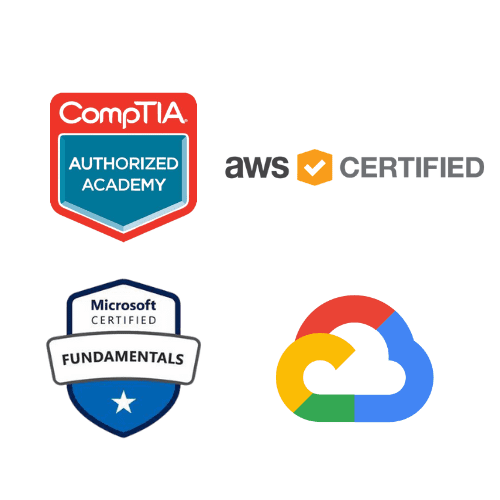
Understanding the Cloud
Ever wondered where your photos go when you back them up or how Netflix streams seamlessly on any device? That’s the cloud at work
But what exactly is this cloud?
In the context of computing, the cloud refers to a system of servers located all around the world that store, manage, and process data, along with running software applications over the internet.
Instead of storing data or running applications directly on your personal computer or local server, you can access these resources via the internet from cloud providers.
Think of it like renting space or power from a larger, remote computer system. This enables users to access their data and applications from any device, anywhere, as long as they have an internet connection.

How Does the Cloud Work?
At its core, “the cloud” is a term used to describe a system of servers located in data centers around the world.
Imagine you have a box in your house where you can store your belongings. Instead of putting things directly into the box, you simply describe what you want to store, and the item instantly gets stored in a warehouse far away, yet you can access it anytime you wish, from anywhere.
That’s similar to how the cloud works. When you save a photo, document, or use a cloud-based application, the data is sent over the internet, stored on these distant servers, and retrieved or accessed whenever you need.
This allows for easy sharing, backup, and access from any device with an internet connection.
Different Types of Clouds
There are four main types of cloud deployments:
- Public Cloud: Services offered by providers like AWS or Google Cloud to anyone via the internet.
- Private Cloud: A cloud setup used exclusively by one organization, often for enhanced security.
- Hybrid Cloud: Combines public and private setups to offer flexibility.
- Multi-Cloud: Uses multiple cloud providers for different tasks or redundancy.
Understanding what the different types of clouds are helps businesses choose the right setup for their goals.
Top Benefits of Cloud Computing
Cloud technology offers the following benefits to organizations:
- Cost savings: Pay only for what you use. No need to invest in heavy hardware.
- Scalability: Add or reduce resources on demand.
- Remote access: Work from anywhere with an internet connection.
- Automatic updates: Your software and infrastructure stay current.
- Disaster recovery: Cloud backups make data loss less risky.
Sound Interesting? Want More Information?
What is Cloud Programming?
Similar to other programming, cloud programming refers to writing software that runs in the cloud, either as web apps or backend services.
Developers build applications using cloud-based tools, APIs, and environments to ensure they scale well and stay online across global networks.
This is a fast-growing area with high demand for talent, especially those with certifications in cloud platforms like AWS, Azure, or Google Cloud.

Career Opportunities in Cloud Computing
For someone considering a career in technology, cloud computing offers a combination of growth, competitive pay, and the chance to be at the forefront of technological advancements. As with any career, it’s crucial to stay updated with the latest trends, tools, and best practices in the field.
Learning cloud computing can open doors to the following roles:
- Cloud Support Specialist
- Help Desk Technician
- Cloud Administrator
- Network Support
- AWS Developer
- DevOps Engineer
Benefits of Learning Cloud Computing
In addition to earning up to $24.71 an hour, learning the cloud offers the following benefits:
- Growth Potential: As businesses continue to move their infrastructure and services to the cloud, the demand for professionals with cloud computing expertise has surged. The market for cloud services has been growing at an exponential rate.
- Salary: Due to the high demand and relatively low supply of skilled cloud professionals, salaries in this domain tend to be competitive.
- Job Security: With the world moving towards digitization, the cloud is becoming foundational to many services. This suggests that there will be long-term job security and relevance for those with expertise in this area.
- Flexibility: Cloud professionals often have the opportunity to work remotely, given that the nature of their work is inherently based on remote cloud infrastructures.
- Multi-Industry Demand: Almost every industry, from finance and healthcare to entertainment and education, now uses cloud services in some form. This broad application means that cloud professionals have the opportunity to work in multiple industries.
If you’re wondering if this is a good career for you, check here.
Reasons to Get a Cloud Certification
It should be noted that most US states and employers ask for certifications for employment. Not to mention that these can be a powerful tool in advancing your career in cloud technology.
Whether it’s from Amazon Web Services (AWS), Microsoft Azure, Google Cloud Platform (GCP), or other cloud providers, certification offers several advantages, including:
- Validation of Skills: A certification is a testament to your skills and knowledge. It serves as a validation that you’ve mastered a certain level of expertise in the cloud technology for which you’re certified.
- Increased Job Opportunities: Many employers specifically look for individuals with relevant certifications when hiring for cloud-related roles. Being certified can give you a competitive edge over other applicants.
- Higher Earning Potential: Studies and surveys have indicated that certified professionals, on average, earn more than their non-certified counterparts in the IT sector.
- Professional Growth: Gaining a certification usually indicates a commitment to professional growth. Many employers appreciate this dedication, which can lead to career advancement opportunities.
Ready to Learn Cloud Computing?
If you’re curious about the cloud or want to level up your tech career, there’s no better time than now.
Choose CCI Training Center’s Cloud Computing Training Program and become job-ready within 25 weeks.










